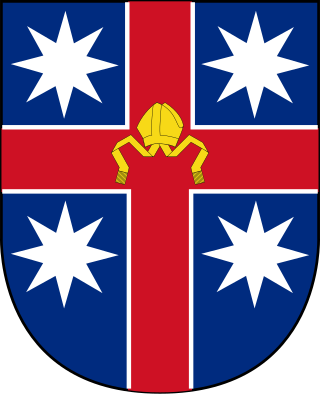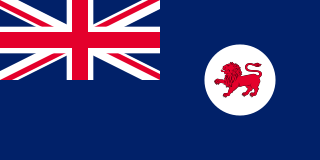
A referendum, plebiscite, or ballot measure is a direct vote by the electorate on a proposal, law, or political issue. A referendum may be either binding or advisory.
In Canada, a separate school is a type of school that has constitutional status in three provinces and statutory status in the three territories. In these Canadian jurisdictions, a separate school is one operated by a civil authority—a separate school board—with a mandate enshrined in the Canadian Constitution or in federal statutes. In these six jurisdictions a civil electorate, composed of the members of the minority faith, elects separate school trustees according to the province's or territory's local authorities election legislation. These trustees are legally accountable to their electorate and to the provincial or territorial government. No church has a constitutional, legal, or proprietary interest in a separate school.

The Anglican Church of Australia, originally known as the Church of England in Australia and Tasmania, is a Christian church in Australia and an autonomous church of the worldwide Anglican Communion. It is the second largest church in Australia after the Roman Catholic Church.

Referendums in the United Kingdom are occasionally held at a national, regional or local level. Historically, national referendums are rare due to the long-standing principle of parliamentary sovereignty. Legally there is no constitutional requirement to hold a national referendum for any purpose or on any issue. However, the UK Parliament is free to legislate through an Act of Parliament for a referendum to be held on any question at any time.

The Blaine Amendment was a failed amendment to the U.S. Constitution that would have prohibited direct government aid to educational institutions that have a religious affiliation. Most state constitutions already had such provisions, and thirty-eight of the fifty states have clauses that prohibit taxpayer funding of religious entities in their state constitutions.

The Parliament of South Australia is the bicameral legislature of the Australian state of South Australia. It consists of the 47-seat House of Assembly and the 22-seat Legislative Council. General elections are held every 4 years, with all of the lower house and half of the upper house filled at each election. It follows a Westminster system of parliamentary government with the executive branch required to both sit in parliament and hold the confidence of the House of Assembly. The parliament is based at Parliament House on North Terrace in the state capital of Adelaide.
In Australia, referendums are public votes held on important issues where the electorate may approve or reject a certain proposal. In contemporary usage, polls conducted on non-constitutional issues are known as plebiscites, with the term referendum being reserved solely for votes on constitutional changes, which is legally required to make a change to the Constitution of Australia.

The Australian republic referendum held on 6 November 1999 was a two-question referendum to amend the Constitution of Australia. The first question asked whether Australia should become a republic, under a bi-partisan appointment model where the president would be appointed by the federal parliament with a two-thirds majority. This was the model that was endorsed by the Constitutional Convention, held in Canberra in February 1998. The second question, generally deemed to be far less important politically, asked whether Australia should alter the Constitution to insert a preamble.
The 1977 Referendums question was a successful amendment to the Australian constitution that allowed Australians living in territories to vote on future referendums. This question was put to voters alongside four others during 1977. With the success of the vote, the Constitution Alteration (Referendums) Bill 1977 passed. In future referendums, the votes of electors in the territories would be counted towards the national total, but would not be counted toward any state total.

A referendum on the status of Southern Rhodesia was held in the colony on 27 October 1922. Voters, almost all of them white, were given the options of establishing responsible government or joining the Union of South Africa. After 59% voted in favour of responsible government, it was officially granted on 1 October 1923 with the implementation of the First Cabinet of Southern Rhodesia.
The History of Australia (1851–1900) refers to the history of the people of the Australian continent during the 50-year period which preceded the foundation of the Commonwealth of Australia in 1901.
Eight referendums were held in Switzerland during 2009. The first was held on 8 February on extending the freedom of movement for workers from Bulgaria and Romania. The next two were held on 17 May 2009 on introducing biometric passports and the "Future with complementary medicine" proposal. A further two were held on 27 September on increasing VAT and the introduction of public initiatives. The final three were held on 29 November on banning the construction of new minarets, exporting weapons and the use of aviation fuel taxation.

The Colony of Tasmania was a British colony that existed on the island of Tasmania from 1856 until 1901, when it federated together with the five other Australian colonies to form the Commonwealth of Australia. The possibility of the colony was established when the Parliament of the United Kingdom passed the Australian Constitutions Act in 1850, granting the right of legislative power to each of the six Australian colonies. The Legislative Council of Van Diemen's Land drafted a new constitution which they passed in 1854, and it was given royal assent by Queen Victoria in 1855. Later in that year the Privy Council approved the colony changing its name from "Van Diemen's Land" to "Tasmania", and in 1856, the newly elected bicameral parliament of Tasmania sat for the first time, establishing Tasmania as a self-governing colony of the British Empire. Tasmania was often referred to as one of the "most British" colonies of the Empire.
The 1933 Western Australian secession referendum was held on 8 April 1933 on the question of whether the Australian state of Western Australia should leave the Australian federation. Nearly two-thirds of electors voted in favour of secession, but efforts to implement the result proved unsuccessful.
During the second half of World War I, the First Australian Imperial Force experienced a shortage of men as the number of men volunteering to fight overseas declined and the casualty rate increased. At the time, military service within the Commonwealth of Australia and its territories was compulsory for Australian men, but that requirement did not extend to conflict outside of Australia. In 1916, Prime Minister Billy Hughes called a plebiscite to determine public support for extending conscription to include military service outside the Commonwealth for the duration of the war. The referendum, held on 28 October 1916, narrowly rejected the proposal. A second plebiscite, held a year later on 20 December 1917, also failed to gain a majority.

John O'Reily was an Australian Roman Catholic clergyman, the first Bishop of Port Augusta, and the second Archbishop of Adelaide. Born in Kilkenny, Ireland, O'Reily studied for the priesthood in Dublin. Upon his ordination in 1869, he migrated to Western Australia, serving as a parish priest in Fremantle, and founding a Catholic newspaper there. When the Diocese of Port Augusta was established in 1887, Pope Leo XIII named O'Reily as its first bishop. Concerned about the financial position of the diocese, he accepted the posting reluctantly. As bishop, he greatly improved the financial position of the new diocese, reducing its debt by half and earning a reputation as a competent administrator.
The Department for Education of South Australia is a state government department delivering school education throughout the state. Education in Australia at school level is managed by each state, though the Commonwealth government makes a significant contribution. The Department was established through the Education Act of 1875 which allowed for the establishment of public schools and contained provisions for compulsory schooling of children aged between 7 and 13. As the state grew quickly into the 20th Century the Education Department expanded across the very large rural areas of the state. After World War II, rising birth rates, large scale immigration and increasing demand for secondary education led to very rapid growth in the Department. The number of private schools grew in this period and with increasing State aid provided growing competition for the State education sector. In the post-war period several of large reviews of education have taken place: in particular the Karmel and Keeves reviews. In 2017, there were 514 Schools and approximately 172,000 students within the Department.
A series of referendums on the proposed constitution of Australia were held between 2 June 1898 and 31 July 1900 in the six colonies that were to become the states of the Commonwealth of Australia. The first four referendums were held in New South Wales, South Australia, Tasmania and Victoria in June 1898. Although all four saw a majority vote in favour, the majority in New South Wales was insufficient. Knowledge of the result in New South Wales led to low voter turnout in South Australia.
A referendum concerning the closing hour for licensed premises and registered clubs was put to voters on 10 June 1916. The referendum was conducted on the basis of optional preferential voting. Preferences were not counted as a majority voted for 6:00 pm closing time.
A referendum concerning introducing prohibition in New South Wales was put to voters on 1 September 1928.









